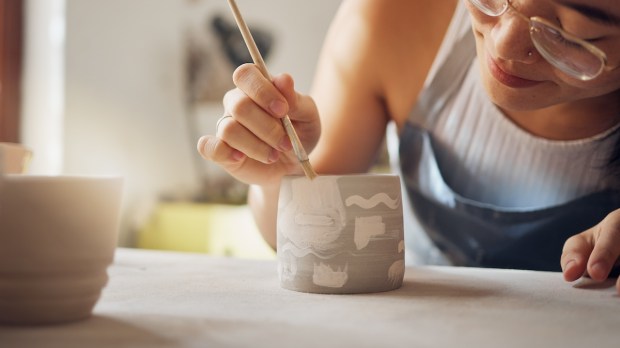I’ve always been attracted to imperfect things. I love reading old books with worn pages that smell like they haven’t been opened for 50 years, wearing the uneven knitting projects that I made as a kid, and hearing the warps on my second-hand records that remind me of the life they lived before me. These quirks are what make the pieces what they are; without these so-called imperfections, these things wouldn’t be perfect to me.
So why am I so harsh about my own quirks?
Last year, I took my first art class since elementary school. All my Play-Doh expertise led me to beginner’s ceramics, where I was immediately humbled. Perfection was an unrealistic standard for my level, so I chose to embrace the imperfections in my art (or what we called “charm” and “character” in class).
I came home that semester with a menagerie of lopsided dishes and trinket trays, all of which I still own and cherish. As I drink my coffee each morning from one of these mugs, its uneven glaze and the fingerprints baked into the clay remind me of all my happy memories from the ceramics studio. I’m glad that I didn’t hold myself to a standard of perfection, otherwise I wouldn’t have my lopsided mug or anything else from class, because perfection was (and still is) unachievable.
In our social media age, it’s hard not to expect perfection from ourselves. I see other people in my life or online who seem to have everything together and wonder why I’m flawed and they’re not. When we hold ourselves to a standard of perfection in any regard, we are bound to fail: Only God is perfect. This perfectionism is often inflicted upon us by Satan — not God— as this striving toward the unachievable leads us to feel shame and guilt for our shortcomings.
When we compare ourselves to others, we lose sight of God’s perfect plan for us, quirks included. As St. Thérèse says, “The splendor of the rose and the whiteness of the lily do not rob the little violet of its scent nor the daisy of its simple charm. If every tiny flower wanted to be a rose, spring would lose its loveliness.”
What we perceive as imperfections in ourselves might be perfections in God’s eyes. They are the field of wildflowers, the worn book covers, the vintage records, the fingerprints in the clay. They are what makes us, us. He created each of our imperfections perfectly, and loving these things about ourselves is just another way for us to love and honor our perfect Creator.
~
This is part of the series called “The Human Being Fully Alive” found here.

